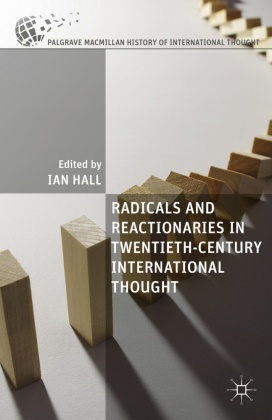Radicals and Reactionaries in Twentieth-Century International Thought
| Verlag | Springer Palgrave Macmillan |
| Auflage | 2015 |
| Seiten | 224 |
| Format | 14,8 x 22,1 x 1,7 cm |
| Gewicht | 426 g |
| Artikeltyp | Englisches Buch |
| Reihe | The Palgrave Macmillan History of International Thought |
| EAN | 9781137447258 |
| Bestell-Nr | 13744725U |
The history of international thought is a flourishing field, but it has tended to focus on Anglo-American realist and liberal thinkers. This book moves beyond the Anglosphere and beyond realism and liberalism. It analyses the work of thinkers from continental Europe and Asia with radical and reactionary agendas quite different from the mainstream.
Inhaltsverzeichnis:
1. Introduction: Radicals And Reactionaries 2. Geopolitics And Nationalism: Interpreting Friedrich Ratzel In Italy, 1900-1916 3. Realism And Globalisation Theory: Common Roots? Kurt Riezler And The Early Twentieth-Century Debate On IR Theory 4. From Collective Security To Collective Defence. British Socialist International Thinkers In The 1930s 5. The IR That Dare Not Speak Its Name: The French Extreme (And Not So Extreme) Right In The 1930s And Its Lessons From And To The History Of Thought In IR 6. Prussianism, Hitlerism, Realism: Images Of Germany In British International Thought, 1900-1950 7. Corporativism And Colonial Expansion In Fascist Italy: An Effort To Overcome The Nation State? 8. Two Wartime Conceptions Of Regionalism: Ideas During The War: E. H. Carr's 'New Europe' And The Japanese 'Greater East Asian Community' 9. 'Mephistopheles In A Saville Row Suit': V. K. Krishna Menon And The West
Rezension:
"It is a fascinating book that challenges our consolidated academic understandings of international theory, uncovering idiosyncratic and contextualised accounts of non-Western, non-Anglophone thinkers during the twentieth century." (Gillian Davenport, Australian Institute of International Affairs, internationalaffairs.org.au, January, 2018)
"All the chapters are very good and well worth reading. The book has enough substance to serve as a source for many class discussions and will hopefully stimulate more scholarship at a time in which we need more ideas and bigger ideas to avoid the now-visible obstacles that threaten civilization and the hopes for a peaceful future." (Laurie M. Johnson, The European Legacy, Vol. 23 (1-2), July, 2017)

